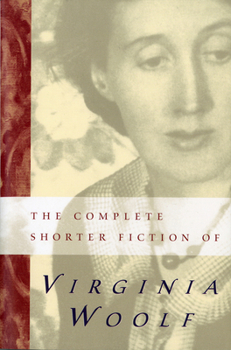The Complete Shorter Fiction of Virginia Woolf: Second Edition
Select Format
Select Condition 
Book Overview
Readers of Virginia Woolf will enjoy this compilation of short stories, ordered chronologically to highlight Woolf's different creative periods.
Woolf continually used stories and sketches to experiment with narrative models and themes for her novels. This collection of nearly fifty pieces brings together the contents of two published volumes, A Haunted House and Mrs. Dalloway's Party; a number of uncollected stories; and several...
Format:Paperback
Language:English
ISBN:0156212501
ISBN13:9780156212502
Release Date:June 1989
Publisher:Mariner Books Classics
Length:364 Pages
Weight:0.81 lbs.
Dimensions:0.9" x 5.4" x 8.1"
Customer Reviews
5 ratings
Great read!
Published by Thriftbooks.com User , 15 years ago
Virginia Woolf's novels, with the exception of Orlando, are magnificent. Her shorter work does not disappoint.
Just as Enjoyable as her Novels
Published by Thriftbooks.com User , 20 years ago
This book is great if you have read all of her novels or have yet to pick up one. It can introduce you to Woolf's style or if you already know what a wonderful writer she is, it will continue to entertain you. These short stories also let you see how she developed some of her novels as well as her style throughout her life. She was unbelievably dedicated to her writing, and this book makes her efforts clear.
Uplifting!
Published by Thriftbooks.com User , 24 years ago
A friend tried to explain what Virginia Wolfe is all about ("She ties it all together in the end.") by letting me read the first short story in this book. What a lovely, lovely story it is! I cannot say more without giving it away, but I will only tell you that I re-read it several times to grab all of its nuances because she makes every word count. I thoroughly enjoyed it!
Lady in the Looking Glass
Published by Thriftbooks.com User , 24 years ago
My favorite story in this collection is "The Lady in the Lookinglass." This story contains a powerful image: the yearning to completely comprehend another person. Such longing, as the narrator distinguishes, is not desire for "dinners and visits and polite conversations," nor "things she talked about at dinner," but something deeper, "her profounder state of being that one wanted to catch and turn to words." On one hand, Isabella represents a synecdoche. If the narrator understands her deeply enough, he could "know everything there was to be known about Isabella," but also life, and perhaps all persons as well. On the other hand, perhaps Isabella objectifies the inability of one person to scale walls of privacy and anonymity another erects to protect herself from intimacy. Our sympathy straddles that wall, perhaps lying first with Isabella who veils herself, then with the narrator who longs to know her. We aren't shown why Isabella has become the trembling convolvulus. But no one's face should reflect "masklike indifference." The phrase is not congruous -- the need to mask is anything but indifferent. And can't we concede tragedy to anyone who, after 50-60 years, remains a person for whom another can claim, "The comparison showed how very little, after all these years, one knew about her; for it is impossible that any woman of flesh and blood of fifty-five or sixty should be really a wreath or a tendril"? This is a heartbreaking image.
Wonderful first steps to understanding Woolf
Published by Thriftbooks.com User , 25 years ago
Woolf is not typically known as a writer of short stories -- "sketches" as she called them. However, the short fiction that she wrote provides a wonderful introduction to her narrative style. The early "Mark on the Wall," "Kew Gardens," and "An Unwritten Novel" give to the reader a sense of how Woolf's technique works within a smaller package than the usual assigned Woolf reading. Her feminist (apologies to VW since she considered the word dead once women were able to earn a living) leanings come through in "A Society" and "Moments of Being: 'Slater's Pins have no Points'." Woolf's early sketches are where she formed her interior monologue style, within which one thing leads to another as the work progresses. These short fiction works should be required reading for anyone delving into Woolf. Possibly those who read these sketches before they dive into the novels would understand a bit better of what Woolf's fiction is made. Excellent.





